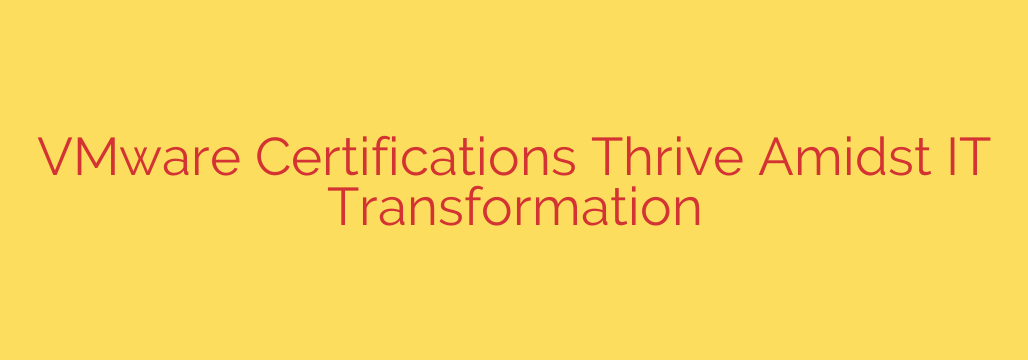
Why VMware Skills Are More Valuable Than Ever in the Age of Multi-Cloud
The IT landscape is in a constant state of evolution. The rise of public cloud, the shift to containerized applications, and the demand for greater agility have fundamentally reshaped how businesses operate. Amid this digital transformation, many IT professionals wonder about the long-term value of traditional infrastructure skills. Is investing in a VMware certification still a smart career move?
The answer is an emphatic yes. Far from becoming obsolete, VMware skills have evolved to become a critical component of modern hybrid and multi-cloud strategies, making certified professionals more sought-after than ever.
The Enduring Foundation of the Data Center
While the cloud has captured headlines, the reality for most enterprises is a hybrid environment. On-premise data centers aren’t disappearing; they are being modernized and integrated with public cloud services. At the heart of most of these private clouds is VMware vSphere, the industry-leading virtualization platform.
Proficiency in VMware virtualization remains a core competency for managing the foundational layer of enterprise IT. Companies continue to rely on its stability, security, and robust feature set to run their most critical business applications. A deep understanding of vSphere, vCenter, and related technologies is not a legacy skill—it’s an essential prerequisite for anyone managing modern enterprise infrastructure.
Bridging the Gap to a Multi-Cloud World
VMware has successfully pivoted from a purely on-premise technology provider to a key enabler of multi-cloud strategy. Solutions like VMware Cloud on AWS, Azure VMware Solution, and Google Cloud VMware Engine allow organizations to extend their existing VMware environments seamlessly into the public cloud.
This creates a unified operational model, reducing complexity and allowing teams to use the skills they already have. For IT professionals, VMware expertise is now a direct pathway to managing complex, multi-cloud deployments. A certification demonstrates that you have the ability to operate across different cloud environments, a skill that is in extremely high demand. Employers are actively seeking experts who can bridge the gap between their private data center and public cloud ambitions.
Embracing the Future with Cloud-Native Technologies
The conversation around modern applications is dominated by containers and Kubernetes. Recognizing this shift, VMware has heavily invested in this space with its Tanzu portfolio. Tanzu is integrated directly into vSphere, allowing administrators to manage both traditional virtual machines (VMs) and modern containerized workloads from a single, familiar platform.
This integration is a game-changer. It means that organizations don’t have to create separate, siloed teams to handle different application architectures. A VMware professional can now be at the forefront of application modernization, supporting developers and deploying cloud-native applications alongside legacy systems. This dual skill set is incredibly powerful and positions certified individuals for leadership roles in their organizations.
The Tangible Career Benefits of Certification
In a competitive job market, validation matters. A VMware certification provides clear, industry-recognized proof of your skills and knowledge. It tells current and future employers that you have a verified level of expertise in designing, deploying, and managing sophisticated IT environments.
Holding a VMware certification often leads to higher earning potential, greater job security, and access to more senior roles. It demonstrates a commitment to professional development and signals that you are equipped to handle the challenges of today’s complex IT infrastructure.
Actionable Steps: Choosing Your Certification Path
VMware offers a range of certifications tailored to different specializations. To maximize your career growth, it’s important to choose the path that aligns with your goals.
- Data Center Virtualization (VCP-DCV): This is the foundational certification for managing vSphere environments. It remains the most popular and is essential for anyone working in an enterprise data center.
- Network Virtualization (VCP-NV): Focused on VMware NSX, this certification is ideal for professionals looking to specialize in software-defined networking, a critical component of modern security and automation.
- Cloud Management and Automation (VCP-CMA): This track is for those who want to focus on building and operating private and multi-cloud environments, with an emphasis on automation and orchestration using vRealize Suite.
- Application Modernization (VCP-AM): A newer certification centered on VMware Tanzu, this path is perfect for professionals eager to lead the charge into the world of Kubernetes and cloud-native applications.
Ultimately, the IT world is not a zero-sum game of old versus new. It’s an integrated ecosystem where established technologies evolve to support emerging trends. VMware has proven its ability to adapt and lead through this transformation. For IT professionals, investing in VMware training and certification is not about holding onto the past—it’s about building a strategic foundation for a successful and future-proof career.
Source: https://www.bleepingcomputer.com/news/security/vmware-certification-is-surging-in-a-shifting-it-landscape/








